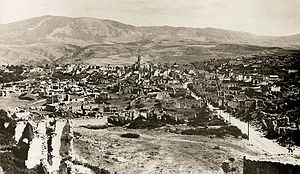舒沙大屠殺
| 舒沙大屠殺 | |
|---|---|
 | |
| 位置 | 納戈爾諾-卡拉巴赫 (亞塞拜然民主共和國和亞美尼亞民主共和國爭議地區) |
| 日期 | 1920年3月 |
| 目標 | 亞美尼亞人 |
| 類型 | 屠殺[1]、騷亂、反猶騷亂 |
| 死亡 | 500[2]至20,000 亞美尼亞人[3] |
舒沙大屠殺發生於1920年3月22日至26日,在亞美尼亞人針對亞塞拜然民主共和國的反抗被鎮壓後,亞塞拜然民主共和國對位於舒沙的亞美尼亞人進行大規模的殺戮,消滅了舒沙一半的亞美尼亞人,並摧毀大量亞美尼亞人的居住區。[4][5][6][7][8][9]
參考資料[編輯]
- ^ The Journal of international relations, Volume 10 By Clark University-page 252
- ^ Richard G. Hovannisian. The Republic of Armenia, Vol. III: From London to Sèvres, February–August 1920 p. 152
- ^ The Nagorno-Karabagh Crisis: A Blueprint for Resolution (PDF). Public International Law & Policy Group and the New England School of Law Center for International Law & Policy: 3. June 2000 [2020-11-15]. (原始內容 (PDF)存檔於2020-11-01).
In August 1919, the Karabagh National Council entered into a provisional treaty agreement with the Azerbaijani government. Despite signing the Agreement, the Azerbaijani government continuously violated the terms of the treaty. This culminated in March 1920 with the Azerbaijanis' massacre of Armenians in Karabagh's former capital, Shushi, in which it is estimated that more than 20,000 Armenians were killed.
- ^ S. Neil MacFarlane, Oliver Thränert,, Balancing hegemony: the OSCE in the CIS, Centre for International Relations, 1997, p. 71 (頁面存檔備份,存於網際網路檔案館) "Another event of the period was the massacre in March 1920 of Armenians in Shusha, the historic centre of Karabakh, which shifted its ethnic status from an Armenian-dominated town to an Azeri-dominated one."
- ^ Brook, Stephen. Claws of the crab: Georgia and Armenia in crisis. 1993: 326.
In the 1920s a massacre of Armenians led to an Azeri majority in the town.
- ^ Chorbajian, Levon. The Caucasian Knot: The History & Geopolitics of Nagorno-Karabagh. London: Zed Books. 1994: 141. ISBN 9781856492881.
The city of Shushi, formerly the third largest city in Transcaucasia, saw its Armenian population decimated by the massacre of March 1920.
- ^ A. Zubov, Политическое будущее Кавказа: опыт ретроспективно-сравнительного анализа (Political future of the Caucasus) (頁面存檔備份,存於網際網路檔案館),"Znamiya" journal, 2000, #4 "Британская администрация почему-то передала населенные армянами уезды Елизаветпольской губернии под юрисдикцию Азербайджана. Британский администратор Карабаха полковник Шательворт не препятствовал притеснениям армян, чинимым татарской администрацией губернатора Салтанова. Межнациональные трения завершились страшной резней, в которой погибла большая часть армян города Шуши. Бакинский парламент отказался даже осудить свершителей Шушинской резни, и в Карабахе вспыхнула война."
"The British administrator of Karabakh, Colonel D.I. Shuttleworth did not interfere with the discrimination of Armenians by Tatarian administration of governor Saltanov. The national clashes ended by the terrible massacres in which the most of Armenians in Shusha town perished. The Parliament in Baku refused even condemn the accomplishers of the massacres in Shusha and the war was started in Karabakh." - ^ Verluise, Pierre, Armenia in Crisis: The 1988 Earthquake, Wayne State University Press: 6, April 1995 [2020-11-15], ISBN 0814325270, (原始內容存檔於2021-04-25)
- ^ Situation des réfugiés et déplacés d'origine arménienne sur le territoire de l'ex-Union soviétique (PDF). Commission des recours des refugies. [2020-11-15]. (原始內容 (PDF)存檔於2018-10-23) (法語).
De 1918 à 1920, les républiques indépendantes d'Arménie et d'Azerbaïdjan se sont disputées le contrôle du Karabagh, pour des raisons symboliques et stratégiques. Des pogroms et des incendies anéantissent le quartier arménien de Chouchi en février 1920.
